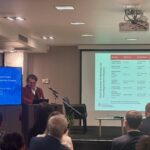Is Europe Ready to Diagnose Earlier, Act Faster?
Brussels, May 13, 2025
Location: Estonian Permanent Representation to the EU
On May 13, 2025, the Estonian Research Council Brussels Office, Flying Health, Eli Lilly, and ScanBalt® co-hosted a high-level seminar at the Estonian Permanent Representation in Brussels to discuss a critical topic: the future of early diagnosis and care for neurodegenerative diseases in Europe. The event, titled “New Modalities in the Management of Neurodegenerative Diseases – Is Europe Ready to Innovate?”, brought together policymakers, healthcare innovators, industry leaders, and researchers to address the pressing need for innovation in the early diagnosis and treatment of Alzheimer’s and Parkinson’s disease.
The growing burden of neurodegenerative diseases in Europe
In 2025, approximately 7.85 million people in the EU are living with Alzheimer’s disease. This figure is projected to surpass 10 million by 2035. Parkinson’s disease is also on the rise, affecting 1.2 million people today and is expected to reach 1.8 million by 2035. This sharp increase is driven by Europe’s ageing population and rising life expectancy, highlighting the urgent need for early intervention and innovative care models.
Recommendations: A Call to Action
During the seminar, participants put forward a comprehensive set of recommendations aimed at transforming the way Europe addresses neurodegenerative diseases:
-
Accelerate the Implementation of the European Health Data Space (EHDS):
EHDS can play a transformative role in managing neurodegenerative diseases by enabling the structured and secure use of health data. This is essential for supporting AI-driven diagnostics, personalised therapies, and cross-border research. All EU Member States are urged to fully integrate the EHDS into their healthcare systems. -
Invest in Innovative Diagnostic Technologies:
Technologies such as AI-enhanced imaging, speech analysis, and blood-based biomarkers offer earlier and more accurate detection of Alzheimer’s and Parkinson’s. Increased investment in R&D and clinical deployment of these tools is critical to improving patient outcomes. -
Foster Cross-Sectoral Collaboration:
Effective innovation requires strong partnerships between healthcare providers, industry, governments, and academia. Stakeholders are encouraged to co-develop solutions through collaborative platforms that promote knowledge exchange and joint technological advancement. -
Streamline Regulatory Pathways:
To ensure timely access to novel treatments and diagnostic methods, regulatory frameworks must be optimised. Simplifying approval processes and enhancing collaboration among regulatory bodies will facilitate patient access to life-changing innovations. -
Advanced Digital Healthcare Integration:
A digitally connected European healthcare ecosystem will vastly improve the efficiency of diagnosis and care. Virtual diagnostics, AI-driven decision support, and digital platforms for care coordination should be prioritised across Member States.
Tackling the challenges ahead
Alzheimer’s and Parkinson’s are complex diseases that begin developing up to two decades before symptoms appear. Early diagnosis is essential but remains underutilised. Recent advances, such as blood-based biomarkers and AI-powered speech analysis, offer promising avenues for less invasive and earlier detection.
Furthermore, the approval of the first disease-modifying treatments marks a turning point in slowing disease progression. However, access to these treatments in Europe remains limited. The region currently lags behind in adoption, which delays patient care and may deter future investment in neurodegenerative research.
A European Imperative
The seminar emphasised that a paradigm shift is needed in how Europe approaches these diseases. Only through sustained innovation, regulatory reform, and unified political will can we ensure that patients receive timely diagnoses and effective care.
The discussions at the Estonian Permanent Representation underscored the importance of aligning national strategies with broader European health priorities.
Conclusions
The May 13 event served as a pivotal moment in shaping Europe’s response to one of its most urgent public health challenges. By leveraging digital tools, artificial intelligence, and cross-sector collaboration, Europe has the opportunity to lead in the global fight against Alzheimer’s and Parkinson’s. The policy recommendations set forth at the seminar provide a clear roadmap for advancing patient care and embracing innovation.
- Dr. Jaanus Pikani
- Prof. Mart Saarma
- Prof.Toomas Toomsoo
- Dr. Stephen Epelbaum
- Prof. Mart Saarma, Dr. Alexandra König, Dr. Markus Mundhenke
- Douglas Drake, Mihaela Nica, Angela Bradshaw, Prof. Toomas Toomsoo
ScanBalt News
17 March 2025
LifeScience4EU Conference 2025 | 15-16 May | Krakow

















